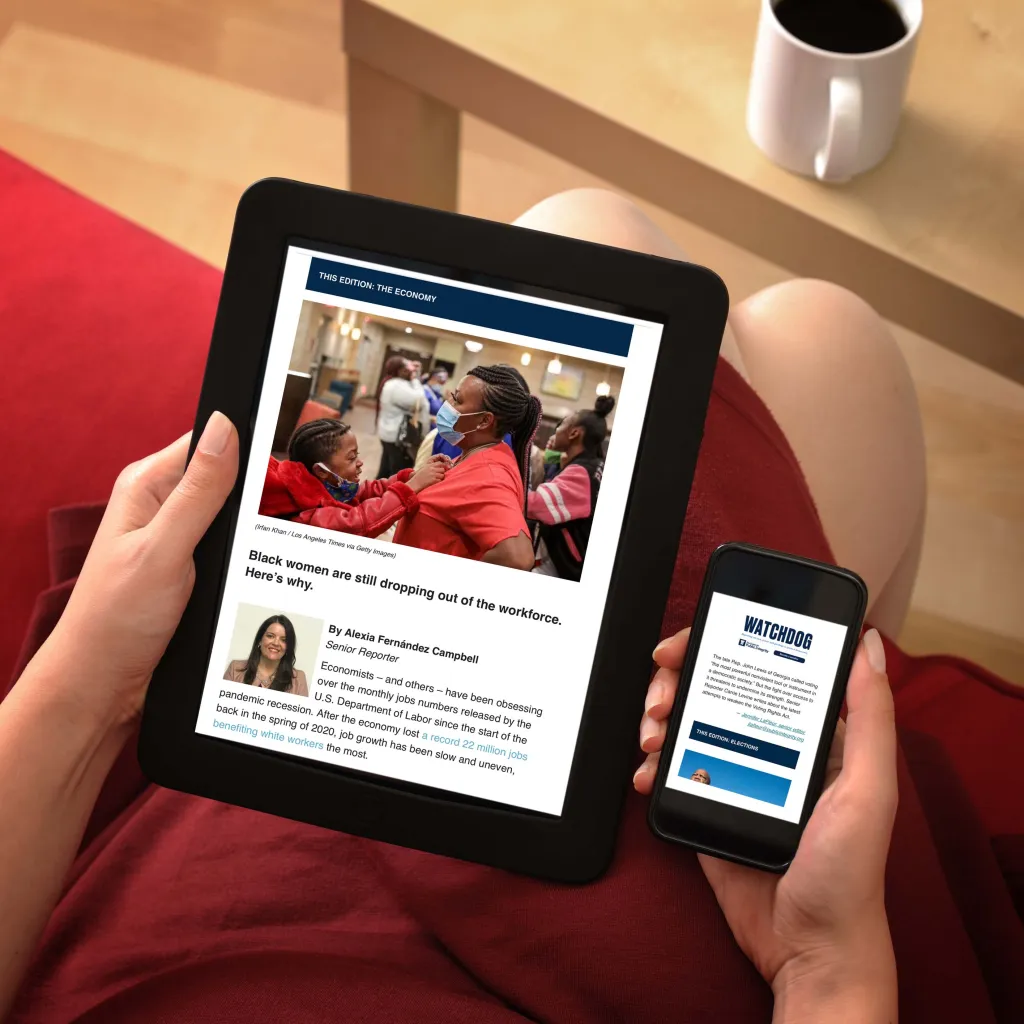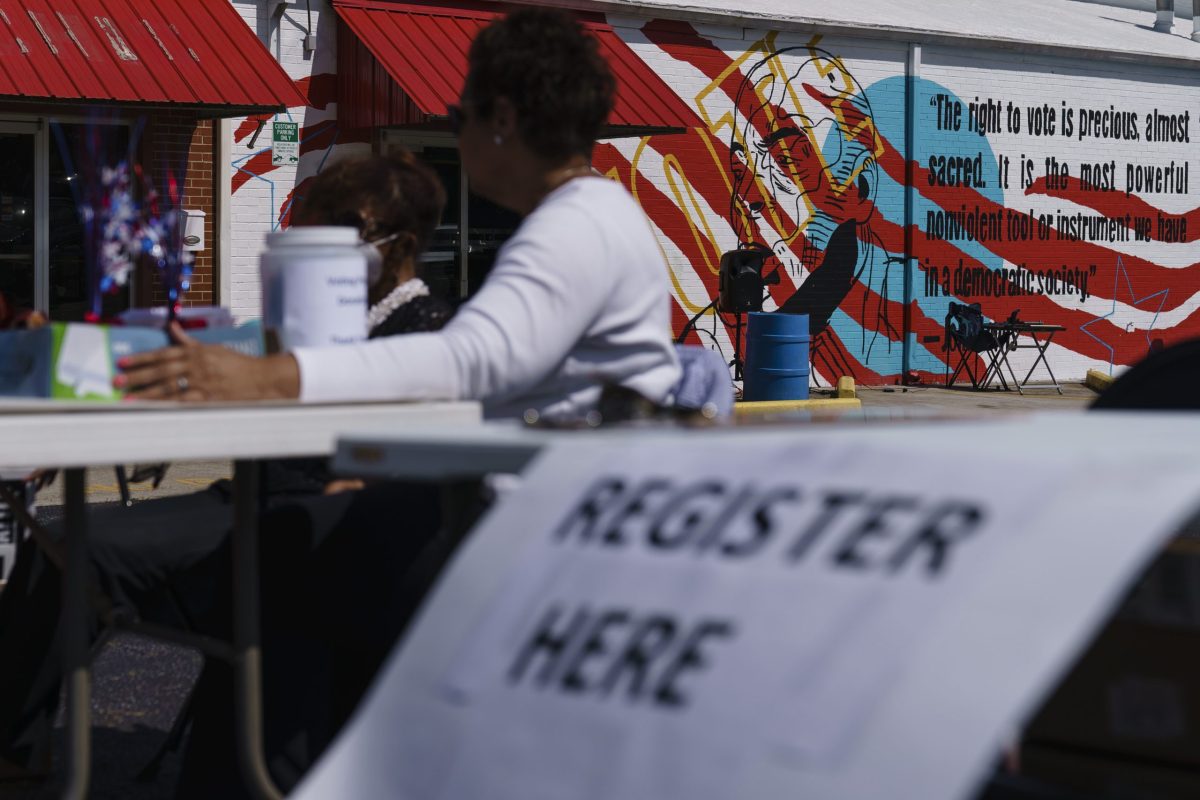In more than half the country, if you’re not already registered to vote, it’s already too late to cast a ballot in midterm elections that will decide control of Congress, state legislatures and numerous state and local offices on Nov. 8.
Included in a slew of new restrictions on voting rights in 26 states controlled by Republicans since 2020, at least five have made it more difficult to register to vote.
A number of states controlled by Democrats are moving in the opposite direction — providing automatic registration systems at state agencies such as the Department of Motor Vehicles, adopting special outreach programs for students, adjusting registration processes to accommodate voters with disabilities, and allowing voters to register up to and on Election Day.
Inequality in the ability to register to vote is widening with these two divergent paths. Residents of Arizona, Florida, Georgia, Ohio and 11 other states must be registered 28 to 30 days before an election, while people who live in 18 states including Colorado, California and Michigan can register through Election Day.
Like other limits on voting, younger and lower-income voters and people of color are disproportionately disenfranchised by lengthy advance deadlines for registering to vote, strict documentation requirements and lack of flexibility for registering online or by mail.
And in states with strict documentation requirements or without online registration or the ability to register and vote on the same day, there can be disproportionate barriers in access for people of color, elderly voters and rural voters who live far from a local election office.
“Registering to vote and being on the voter rolls is a prerequisite to exercising the fundamental right to vote, and anything that’s a barrier to getting on, and staying on, the registration lists can act as a barrier to enfranchise,” said Steven Lance, a policy counsel at the Legal Defense Fund.
This can include having “unnecessarily long deadlines” ahead of an election, he said.
“A lot of us aren’t actually thinking about an election more than a month before it,” Lance said. “If people aren’t registered in some of these states a full month before, by the time the election is on their radar and they’re ready to vote, it’s too late for their registration to become active so they can participate.”
Registration is a key factor in access to voting
A 2020 study from Northern Illinois University found that three registration-related factors significantly help break down barriers to casting a ballot: online voter registration, Election Day (or same-day) registration and automatic voter registration.
Texas makes it harder than any other state, forcing voters to register over a month before Election Day and lacking an online registration system. And four other states – Mississippi, Arkansas, Oklahoma and South Dakota – also hit the trifecta, currently without online, automatic nor same-day voter registration.
Automatic voter registration adds eligible voters to voter rolls whenever they interact with statewide databases. For example, if you renew a driver’s license as a U.S. citizen, the computer checks if your name, address and age are in the voter rolls already. If they’re not, you’ll be added automatically.
In California, voter registration had been long available at the Department of Motor Vehicles. But when registration became automatic in 2018, registrations through the DMV more than doubled.

About this series
This project looks at the state of voting access, voting rights and inequities in political representation in all 50 states and Washington, D.C.
Same-day registration has been proven to boost turnout across all voters, but it especially drives higher turnout among Black and Latino communities.
Online voter registration has exponentially boosted registration rates. South Dakota’s voter registration rate increased over 500% after implementing online registration, according to the Legal Defense Fund. Washington and Kansas also saw registration rates through DMVs double after creating online systems.
It’s harder to register here
Since the 2020 presidential elections, these states have made it harder to register to vote:
Arizona: A new state law, which is being challenged by the U.S. Department of Justice, requires residents to show proof of citizenship to register to vote, something that advocates say could disenfranchise elderly Indigenous residents who are less likely to even have a birth certificate or similar documents used to prove it.
Georgia: A 2021 law restricted the number of Sundays where people can register to vote. Sunday was traditionally a time when Black congregations would register to vote together after church services wrapped up.
Kansas: A 2021 law made the League of Women Voters of Kansas and other nonprofits suspend voter registration drives. One of the provisions of this new law makes it a crime to engage in activity that “gives the appearance of being an election official.”
“Kansans miss the opportunity to be engaged, our team misses its right to exercise free speech, and our democracy is undermined,” Davis Hammet, president of social justice group Loud Light, told the Kansas Reflector.
Organizations argue in court filings that there’s a “serious risk” someone will mistake people hoping to help with voter registration as election officials. As a result, organizations traditionally responsible for managing a large portion of the state’s voter registration efforts have stopped.
Hammet told Public Integrity earlier this fall that his organization registered more than 10,000 new voters prior to the 2020 election.
Montana: HB 176, passed last year, repealed the state’s Election Day registration law and moved the registration deadline to the day before Election Day.
The Montana Supreme Court blocked the law repealing Election Day registration in September, though a final ruling is still to come.
Texas: Voter roll purges are common practice in Texas. Just last year, the state tracked down and removed voters from voting rolls, flagging them as noncitizens. County workers found up to 17% of those individuals had legally registered to vote at their naturalization ceremonies, the Texas Tribune reported.
But it’s easier to register here
These states have made it easier to register to vote since 2020:
California: A new “motor voter” law, passed in 2021, is improving the automatic voter registration process at the Department of Motor Vehicles.
Automatic voter registration through the DMV (passed in 2015) has significantly increased the state’s registration rate.
Colorado: Senate Bill 250, passed last summer, made registering to vote easier in a few ways: Automatic voter registration was expanded to Medicaid and other state agencies. Voters became eligible to register online using their social security number. Colleges became required to give information to students each semester about how to register to vote.
Connecticut: Automatic voter registration has recently been expanded, allowing eligible voters to register through more state agencies, as well as the DMV.
Delaware: An automatic voter registration system was created at the Delaware Division of Motor Vehicles via Senate Bill 5, passed in March 2021.
Hawaii: Senate Bill 159, passed in April 2021, created automatic voter registration, allowing Hawiians to choose if they wanted to register to vote or change their registration information while applying for identification or a driver’s license.
Illinois: High schools are now required to provide voter registration information to students. The schools also can’t prohibit nonpartisan voter registration on its premises.
Maine: Student IDs became acceptable as voter registration identification. By 2023, the secretary of state needs to create an online voter registration system.
Maryland: The state’s Department of Public Safety and Correctional Services needs to provide individuals released from correctional facilities with voter registration applications, and certain signs need to be displayed in parole offices to teach former inmates how to vote. The State Board of Elections and local boards have to provide eligible incarcerated voters the right to vote.
Nevada: Voters with disabilities recently became eligible to register to vote (as well as cast an absentee ballot) electronically. Additionally, more state agencies became eligible to register voters via the state’s automatic voter registration program.
Oregon: House Bill 2681, signed into law in June 2021, requires currently inactive voters to be notified and given instructions on reactivating their voter registration.
Virginia: Same-day registration was enacted in 2020, and it went into effect on Oct. 1. Additionally, anyone 16 or older can preregister to vote thanks to House Bill 2125, signed into law in March 2021.
Change is slow even in some blue states
Change has been slow in some other states controlled by Democrats who tout their support for greater access to voting.
In Delaware, the state legislature adopted same-day voter registration following the 2020 election, but the state Supreme Court recently ruled that language in the state’s constitution prohibits it.
In reliably Democratic Rhode Island, the registration deadline is the strictest allowed by federal law — 30 days before Election Day. This is “by far the biggest obstacle” for Rhode Island voters, John Marion, executive director of Common Cause Rhode Island, previously told Public Integrity.
It’s been written into the state constitution as the longest time allowed, so advocates fear it’ll take a large, heavy-lift shake-up to change this.
In New York, which in many other ways takes a progressive approach to election access, voters rejected same-day registration last November, following a “Just Say No” campaign by conservative politicians and interest groups.
“The people of the state of New York voted — during a pandemic — to restrict their own rights,” Jarret Berg, co-founder of VoteEarlyNY, previously told Public Integrity. “More people in Brooklyn left that question blank than voted no, whereas in Nassau County, far more people, proportionately, turned out and voted no.”



